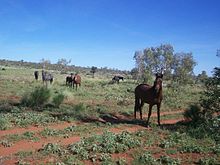brumby
Appearance
See also: Brumby
English
[edit]
Etymology
[edit]Unknown; perhaps from James Brumby, early Australian soldier and pastoralist, who is said to have left horses at his abandoned property.
Pronunciation
[edit]- IPA(key): /ˈbɹʌmbi/
Audio (General Australian): (file)
Noun
[edit]brumby (plural brumbies)
- (Australia) A wild or feral horse.
- 1938, Xavier Herbert, chapter VIII, in Capricornia[1], page 125:
- I'm too weak to ride. I'd have to ride, because for one thing the white-ants have eaten the wheels of my buckboard, and my one cart-horse has gone bush with the brumbies.
- 1943, H. Lorna Bingham, The Lost Tribe, Sydney: Winn and Co., page 31, column 2:
- "It could mean one of two things," he said. "Either that help is coming, or that a herd of wild brumbies is passing somewhere near."
- 1976, Tom Lee McKnight, Friendly Vermin: A Survey of Feral Livestock in Australia[3], page 17:
- If the latter situation prevails, brumbies can be developed into valuable stockhorses, either for use on the local property or for sale in other areas.
Whatever the condition of a captured brumby, there is always the potential of selling it for pet food, fish bait, or even for human consumption.
- 1988, Tom Cole, Hell West and Crooked:
- Harry Farquharson said there were two or three springs and that the horses were “bloody wild”. He said there were probably about 300 and they were good horses, a long way above the average brumby.
Translations
[edit]feral horse
|

